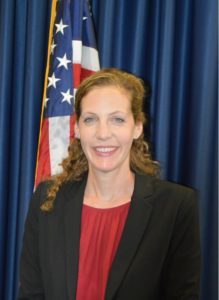
Courtesy of the U.S. Attorney’s Office
One of the first projects for Jennifer Arbittier Williams in her new role as acting United States attorney for Philadelphia and surrounding counties is the creation of the Threat Intervention and Prevention Network — a program designed to stop acts of terror before they happen.
“Even though I am a prosecutor, my goal is to prevent crime from happening, and it would be the best result if no prosecutions arise from it whatsoever,” said Williams, who was appointed in January. “The goal is to stop people before they reach the point where they commit violence through whatever support or redirection we can provide. And we’ll do that through relationships within law enforcement and relationships within the community.”
Williams was raised Jewish, and her father, Steven Arbittier, was president of Reform Congregation Keneseth Israel in Elkins Park in the 1990s. When she was 15, her great-uncle, Leon Klinghoffer, was killed by Palestine Liberation Organization hijackers aboard the cruise ship Achille Lauro. The loss of her uncle made the threat of terrorism feel personal and urgent.
“It was devastating to the family, but the fact that Leon Klinghoffer was Jewish, and it was the PLO that committed the act of terrorism, made my family and I believe the Jewish community feels extra vulnerable to acts of terror, even if they’re just civilians living in the United States. So that definitely impacted my desire to go into national security prosecution,” she said.
She was working at a New York City law firm when she saw the second plane hit the Twin Towers on 9/11. Shortly after that, she had her first interview to be a federal prosecutor and moved back to Philadelphia to work in the U.S. Attorney’s Office. She became a prosecutor for terrorism cases and eventually chief of its national security unit.
Her newly-created TIP Network consists of two branches, the Core Team and the Community Team, according to the U.S. Attorney’s Office website. The former is composed of threat assessment experts from more than a dozen law enforcement agencies, and the latter is made up of organizations throughout the Eastern District of Pennsylvania, including businesses, nonprofits, educational and medical institutions, community and religious groups and others.
The Core Team trains the Community Team to respond to potential threats. During the program’s upcoming meeting on May 25, Williams said the Core Team will explain factors that can be predictive of violence and provide a case study of mass violence to analyze. The goal is to help communities recognize when individuals are seriously contemplating or planning violence and arrange intervention before someone gets hurt.
Jewish Federation of Greater Philadelphia has joined the Community Team.
“It’s a win-win situation, not only for Jewish Federation, but also for the law enforcement community folks that we would be working with,” said Frank Riehl, director of security for Jewish Federation.
He said there had been an increase in anonymous threats over the past year and many of Jewish Federation’s partner organizations have experienced Zoom bombings — virtual services and meetings being hijacked by anti-Semitic actors who use graphic or threatening images and audio to intimidate participants.
He said law enforcement agencies like the FBI have already helped him assess the credibility of various threats and offered advice for enhancing security.
“Not only do they become aware of it, but they also assist me in identifying whether or not it’s a legitimate threat, or if it’s just some knucklehead acting tough behind his internet presence,” Riehl said.
Williams acknowledged that some communities may feel wary about partnering with law enforcement out of fear that providing information could lead to surveillance and prosecution.
“We have talked to members of the Core Team in detail about how important things like vocabulary are, because we want to make sure we are very clear about our mission and about our approach so that we don’t trigger distrust, which I imagine would be natural among some people, so it will be a process,” she said.
This year has already seen a spate of domestic terrorist incidents, from the Jan. 6 attack on the Capitol to mass shootings in Georgia and Colorado. Williams said the uptick in violence, which could possibly stem from the pandemic exacerbating mental health issues and fear, is encouraging her department to roll out the new program as soon as possible, and that many of their community partners feel the same way.
“People are eager to speak with us and meet with us and consult with us because everybody is feeling like they need to be very aware of potential threats right now, because any threat could turn into violence if people aren’t paying attention,” she said.






